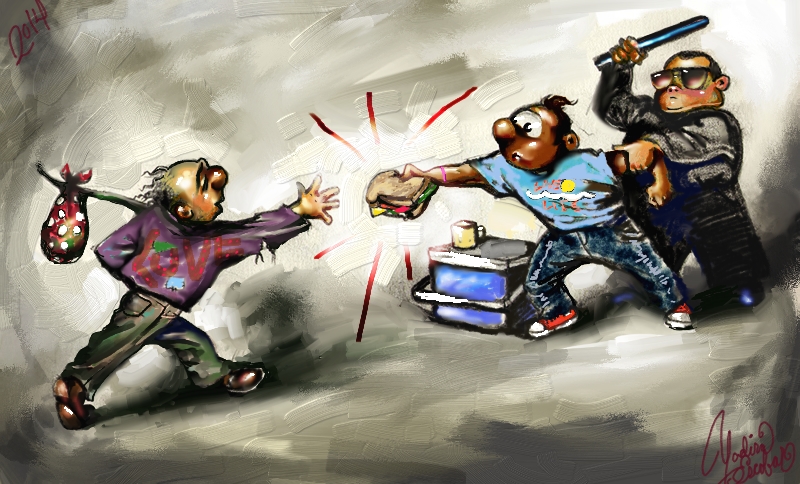
Hunger
MIAMI – Between 30 and 50 percent of the food produced in the world is discarded after being processed, not because it is infected by poisonous fungus or harmful bacteria or because it is discovered that the raw material was genetically altered.
Tons of food are dumped simply because it is not visually attractive, because it’s past its due date, because it endangers favorable prices, or for similar reasons that have nothing to do with its quality.
According to various organizations, one of each five children in the United States goes hungry. In 17.6 million American homes, placing a plate of food on the table every day is a very difficult task.
The human body needs to consume a long list of proteins, carbohydrates, minerals and vitamins to stay healthy. Moreover, it is well known that permanent malnutrition is a worst threat than the sharpest hunger, but the luxury of choosing one’s adequate nutrition is pushed to the background when one can barely stand or remain awake.
A sandwich, a refreshment or a bowl of soup acquire tremendous value when one has not consumed the necessary calories for a while.
I’ve grown up seeing beggars standing at traffic lights, curled up under the few bridges that have not been modified against them, or sleeping under cardboard boxes, but lately I’ve seen more and more homeless people who break the pattern.
Mentally, most Miamians are not moved by the bearded and dirty men who hold up signs with moving messages, because those men often have alcohol in their breath. For years, the homeless people who personify those classic attributes have been attacked by elitists who have devoted themselves to creating a whole systems of responses to that phenomenon.
However, public sensitivity is not at all ready to see entire families homeless. There is no official discourse that can morally condemn an entire family on the street. There are not many arguments to really blame a family nucleus, other than the tired and irrational demand that they “get a job.”
More and more frequently, I have seen small families who have lost the roof over their heads. The other day, I saw a very young couple with children — even one in a baby carriage — holding hand-written signs that asked for food, outside an elegant middle-class supermarket. They weren’t asking for money, just any edible product.
Many people in this country don’t allow a sincere discussion about that social taboo called hunger. Since President Lyndon B. Johnson’s speech in 1964 about the new “war on poverty,” which opened the doors to food stamps, hunger is not a topic for conversation.
Inconceivable though it may seem, for 50.1 million Americans, getting food is a major challenge. This painful figure contrasts sadly with the fact that every year about $165 billion in food is thrown into the garbage.
I imagine that at least once all of us in South Florida have read a sign saying something like “Am hungry, need food.” We know that there are some charitable organizations, often associated with and organized by religious centers, but there aren’t many of them and they don’t frequently offer food.
What happens then if someone personally wishes to give food to a needy person?
Before you share your lunch with them, you should know that it is totally illegal to do so. As a normal and compassionate person without the proper permits, you cannot share your food with someone who’s hungry. Don’t even try to sidestep the regulations, because to ignore the ordinances that force you to obtain costly and hard-to-get permits will result in your arrest and fines of as much as $300.
Members of the organization FoodNotBombs, situated in Orlando, Fla., one of the groups that has challenged that city’s legislation the most, have been arrested for distributing food. Worse yet, they’ll have to pay about $120 a week to feed the hungry. They have complained to the authorities that they are neither professionals nor rich.
In numerous cities in the United States — Miami among them — the initiative of feeding the hungry is prohibited. It may be for fear that the needy will get comfortable and remain in public sites like the center of the city, in view of everyone.
The few institutions that offer food or beds to spend the night are located in the cities and, because the poor almost always travel on foot, they usually gather in the most public and popular places in any city. Therefore, with measures like that one, the main purpose is to scare that unfortunate population and make their lives impossible, so they’ll pick up their baggage and leave.
For many years now, several cities have passed laws that prohibit or regulate that practice. In Miami, the law was allegedly imposed because of the concern that the hungry might be given food that has not been certified or has been declared “unhealthy” by some expert.
In 2012, the mayor of Philadelphia criticized the ad-hoc services that gave food to poor people as “unworthy and unhealthy.” That’s the argument that we’re expected to assimilate, that the root of everything is concern for food safety and public health.
I think that, above all, these political leaders don’t know hunger, they haven’t experienced it in the flesh. When someone has not eaten for several days, his least worry is how much harmful salt or sugar is in the sandwich that a charitable citizen prepared in his kitchen.
Progreso Semanal/ Weekly authorizes the total or partial reproduction of the articles by our journalists, so long as the source and author are identified.


